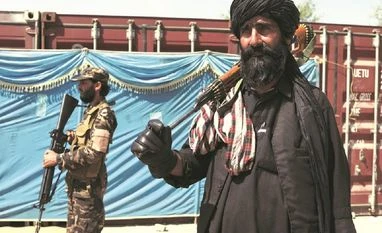The Afghan Taliban regime on Wednesday lodged a strong protest with Islamabad over an air strike carried out by Pakistani jets near the Pak-Afghan border on Tuesday. According to a statement from Kabul’s foreign ministry, reported by Pakistani publication Dawn, the ruling Islamic Emirate warned that Afghanistan’s territorial sovereignty is a red line. Meanwhile, the Tehreek-i-Taliban Pakistan (TTP) has reportedly claimed that all its commanders, including the head of its media cell, remain alive and unharmed despite the Pakistani strike.
"The foreign ministry of the Islamic Emirate of Afghanistan summoned Pakistan’s charge d’affaires in the afternoon and handed a strong protest note over Pakistani military planes bombing in district Bermal in Paktika province near the border just across the Durand Line," the statement issued by Kabul on Wednesday said. It criticised the "aggression by [the] Pakistani military", highlighting that it occurred while a Pakistani government representative was in Kabul for discussions with Afghan officials. The statement further alleged that the killing of civilians by “certain elements” aimed to undermine trust between the two nations.
This statement from the foreign ministry came after a harsher response from Afghanistan's defence ministry, which asserted that the majority of those killed or injured were civilians and refugees from Pakistan's Waziristan tribal area.
What is known about Pakistani air strikes in Afghanistan?
At the time of publishing, Pakistan's Foreign Office and the military's media arm, Inter-Services Public Relations, had not issued any official statement regarding the air strikes in Paktika, located across the Durand Line from the restive tribal districts of North and South Waziristan, as reported by Dawn.
However, the AFP news agency cited a senior Pakistani security official who stated that the strikes targeted “terrorist hideouts” using jets and drones, claiming that the operation resulted in the deaths of at least 20 militants.
Other reports, citing Pakistani security sources, suggested that the air strikes targeted camps operated by Pakistani militant commanders and a facility belonging to the TTP's media wing, Umar Media. These sources claimed the attack resulted in over 60 casualties (dead and injured) among members of the banned group.
The recent escalation came after a deadly attack by the TTP in South Waziristan on Saturday, which claimed the lives of 16 members of Pakistan's paramilitary Frontier Corps.
According to AFP, a Pakistani security official indicated that the attack in South Waziristan was a "significant trigger" for Tuesday’s air strikes, though "not the only one".
Why does the timing of Pakistani air strikes matter?
The air strikes coincided with Pakistan’s special envoy, Ambassador Muhammad Sadiq, and his delegation holding talks with Afghanistan’s interim interior minister, Sirajuddin Haqqani, and foreign minister, Muhammad Muttaqi. The discussions reportedly centred on bilateral issues, including Pakistan’s security concerns regarding militant groups allegedly operating from Afghan territory.
The visit, marking the resumption of diplomatic engagement after a year-long hiatus, was widely seen as an attempt to renew ties between the two countries, which have been strained by disagreements over the TTP and its presence in Afghanistan—a longstanding source of tension between Islamabad and Kabul.
Despite the air strikes, Ambassador Sadiq’s visit to Kabul appeared to proceed unhindered. On Wednesday, he met Deputy Prime Minister Maulavi Muhammad Kabir and Commerce Minister Nooruddin Azizi to discuss key bilateral matters, including peace, security, economic cooperation, and trade, as reported by Dawn.
Were the Pakistani air strikes effective in achieving their objectives?
No, not according to the TTP.
While the Afghan Taliban admitted that some of those killed were “refugees from Waziristan” — a term which Dawn reported is interpreted in Pakistan as a reference to TTP militants — they maintained that the victims also included “innocent women and children".
At the same time, social media accounts linked to the TTP sought to refute the claims made by Pakistani security officials, asserting that all their commanders, including the head of its media cell, were unharmed and alive.
To support this, Umar Media released a video featuring its chief, Chaudry Muneebur Rehman Jatt, to demonstrate he was still alive. However, the authenticity and timing of these posts could not be independently verified.
)